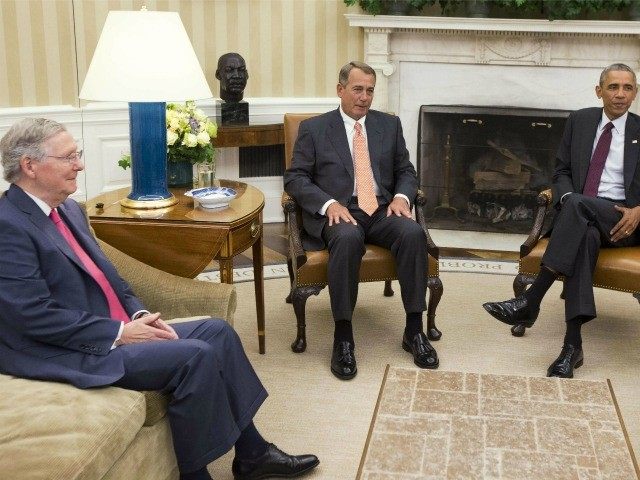Senate Majority Leader Mitch McConnell says the chamber will take up legislation granting President Obama broad negotiating authority for a new mega-trade deal “very soon.”
“It’s been almost an out of body experience but we’ve been working closely with the White House,” McConnell tells reporters. “We’re working together to try to get it across the finish line.”
Earlier this week, House Speaker John Boehner said that while his Republicans support giving Obama broad new powers, he would need the votes of more Democrats to pass legislation. He asked Obama to enlist the help of Hillary Clinton in securing votes.
Securing the “fast track” authority to finalize a new trade deal, covering 40 percent of America’s exports, is a top priority for the Obama White House. The agreement, named the Trans-Pacific Partnership, would set new rules for America’s economic relations with Asia.
Under “fast track” authority, the administration could negotiate the final terms of the deal and the final treaty would only be subject to an up or down vote by Congress. The final provisions agreed to by Obama could not be altered.
Similar authority has been granted to Presidents in the past, from both parties, who have generally used new trade deals to benefit the American economy. It apparently bears repeating, however, that President Obama’s conception of his executive powers differs markedly from past Presidents.
At the beginning of the year, House Republicans filed suit against the Obama Administration over its use of executive orders to make sweeping changes to federal law.
At the time House Speaker Boehner explained the lawsuit, saying, “It’s about the Constitution. It’s about the rule of law. We’re a coequal branch of our government, and the president doesn’t have the ability to just change law all by himself.”
In recent weeks, Republicans have stepped up criticism of Obama’s ongoing negotiations to lift economic sanctions on Iran in exchange for some changes to the nation’s nuclear weapons’ program. Senate Republicans even sent a letter to the Iranian leadership, caution the country that a future President or Congress could reverse agreements made by Obama.
It is an understatement to say that there is a certain amount of distrust between Congressional Republicans and President Obama. This distrust is most acute on the issue of Obama’s executive powers.
Yet, inexplicably, Republican leaders are striving to grant Obama additional executive powers. More baffling is the fact that the public has no idea how these additional powers will be used or to what end.
The Trans-Pacific Partnership may be like past trade deals and provide a well-needed boost to the economy. Unfortunately, the public only has the vaguest idea of what the treaty would actually do.
Only members of Congress can even look at the broad outlines of the deal and they have to do this in a specially-designated room. They aren’t allowed to make copies or take notes. They actually have to surrender any notes they take after looking over the proposed deal.
Both progressive Robert Reich and conservative Sen. Jeff Sessions have criticized what they claim is in the agreement. Both have echoed calls to make the deal public.
Contrast this with the last major trade deal, the North American Free Trade Agreement, NAFTA. The public debated the merits of the deal for months before “fast track” authority was granted to the President. Presidential contender Ross Perot amused, and likely confused, Americans for months with his charts and graphs about an economic “giant sucking sound” that would result from the deal.
The consequences of NAFTA were less than those claimed by supporters and opponents. It has generally been a net positive for the American economy, but it absolutely succeeded in raising a general public debate about the merits and pitfalls of free trade. The body politic is richer for the debate.
Washington, it seems, no longer debates the underlying policy disagreements. It debates the procedures and politics surrounding those debates. The town is consumed by the politics of issues, rather than the issues themselves. Sunday’s “Meet the Press,” for example, didn’t discuss the trade deal itself, but the political maneuverings necessary to get the deal done.
The details of this specific deal matter. The public is witnessing Republican leaders ignoring their past complaints about President Obama and striving to award him sweeping new executive powers.
What is in the Trans-Pacific Partnership that warrants such a remarkable reversal of their positions? For some debates, you have to “show your work.” Republican leaders and members owe this to the American public.

COMMENTS
Please let us know if you're having issues with commenting.